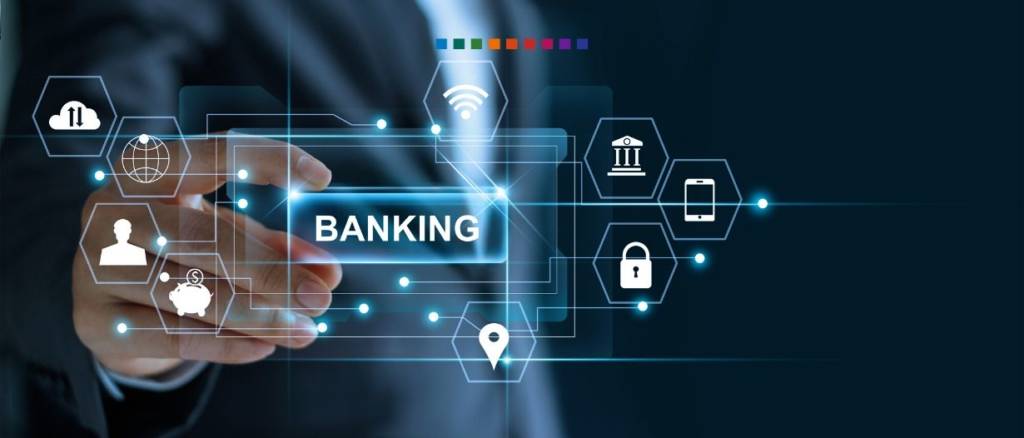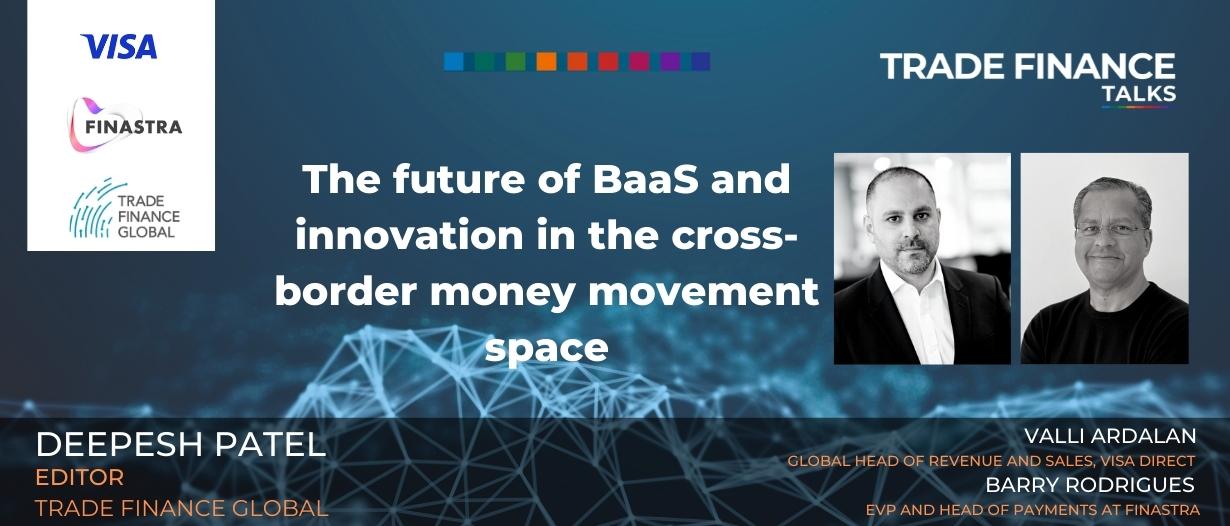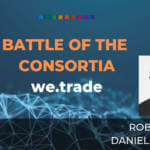Listen to this podcast on Spotify, Apple Podcasts, Podbean, Podtail, ListenNotes, TuneIn
Estimated reading time: 5 minutes
$7 trillion is enough to pique anyone’s interest.
That’s the size of the market opportunity for a new space that has been borne out of a series of shifts and accelerated digital advancements within the financial sector: banking as a service (BaaS).
The possibility of this new offering continues to draw attention, placing it high on the strategic agenda for executives from all areas of the economy.
To find out more about BaaS and innovations within the treasury management sector, Trade Finance Global (TFG) spoke with Valli Ardalan, global head of revenue and sales at Visa Direct, and Barry Rodrigues, EVP Payments Business Unit at Finastra.

What is BaaS?
BaaS is the provision of banking products and services to non-bank third-party distributors through application programming interfaces (application programming interface [API]).
“By integrating non-banking businesses with regulated financial infrastructure, BaaS offerings are enabling new specialised propositions and bringing those to market a lot faster,” Rodrigues said.
“The great thing about banking as a service is that it makes financial products accessible to the users at the point of need rather than within the constraints of traditional financial institutions.”
While it has historically been a bit of a buzzword, organisations now understand that to continue providing value where clients need it, they must provide some of these BaaS offerings.
“Businesses of all sizes stand to benefit directly from leveraging these APIs and tailoring their offerings for clients and consumers,” Rodrigues said.
“Financial institutions are now able to reach a greater number of customers at a lower cost, and distributors can now open new lines of revenue by building relationships with the customers directly.
“It’s about more than just moving money, but really about the ability to offer rich data that can be analysed to provide organisations with that extra layer of financial transparency and control so that they can offer an improved user experience.”
As advancements in consumer technology continue to be made, many modern individuals are becoming increasingly conditioned to expect a seamless user experience in all areas of their digital life––including their work life.
“Banking as a service is ushering in that capability and bringing in a ton of new financial services by reconfiguring the banking value chain and accelerating growth through that digital transformation,” Ardalan said.
“It has [potentially] led to a really empowering shift in the consumer banking experience.”
The proliferation of these backend capabilities could also make it easier for small- and medium-sized enterprises (SMEs) to serve their own customer desires.

Enhanced small business offerings
According to Finastra, Around 80% of US small businesses now have an online presence, most of which are facilitated through some type of integrated service provider.
“What we have found is that these distributors are focused on providing a world-class customer experience,” Rodrigues said.
“Traditional product providers are now increasingly folding in financial services as part of that offering.”
When surveyed, around half of these digitally-present businesses are interested in doubling down and implementing broader financial services as part of their offerings.
When you look at consumer behaviour patterns, this is not surprising.
“The pandemic has changed behaviour and banks are increasingly under pressure to implement and launch new digital programs for their customers,” Ardalan said.
Rodrigues added, “Now, customers are consuming financial services on their terms and where they want to consume them, which is not necessarily in a bank channel.
“BaaS allows financial institutions to participate in that world by pushing their highly valuable infrastructure and licensing capabilities to end customers through different channels.”
The road looks bright for the future of BaaS.

The future of BaaS
As with most new technologies, it is easy to question the longevity of BaaS.
“Is it a fad? Is it a buzzword? We absolutely do not believe it. We believe it’s here to stay. It will continue to mature,” Ardalan said.
“In retail, distributors will be choosing BaaS over traditional banking, potentially to increase customer loyalty and retention.
“In the SME segment, we will start to see a lot more of a one-stop-shop solution that decreases operating costs, reducing the overall price to market.”
While those embedded in the industry want it to grow, they don’t necessarily want consumers to see it happen.
“I look at the future of payments. I often say that if we’re doing what we’re doing well, we’re invisible in this process,” Ardalan said.
“And in order to be truly invisible in something, everything needs to be seamless, secure, cost-effective, and well connected.”
Disclaimer: This podcast contains forward-looking statements within the meaning of the U.S. Private Securities Litigation Reform Act of 1995 that relate to, among other things, our future operations, prospects, developments, strategies, business growth and financial outlook. Forward-looking statements generally are identified by words such as “believes,” “estimates,” “expects,” “intends,” “may,” “projects,” “could,” “should,” “will,” “continue” and other similar expressions. All statements other than statements of historical fact could be forward-looking statements, which speak only as of the date they are made, are not guarantees of future performance and are subject to certain risks, uncertainties and other factors, many of which are beyond our control and are difficult to predict. We describe risks and uncertainties that could cause actual results to differ materially from those expressed in, or implied by, any of these forward-looking statements in our filings with the SEC. Except as required by law, we do not intend to update or revise any forward-looking statements as a result of new information, future events or otherwise.
Availability varies by market. Please refer to your Visa representative for more information on availability.

































